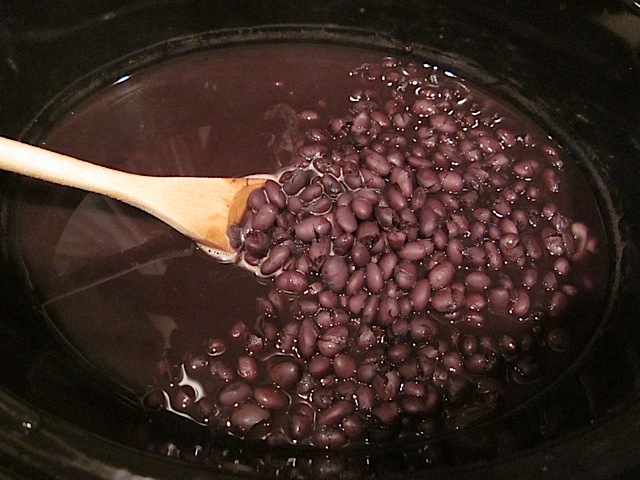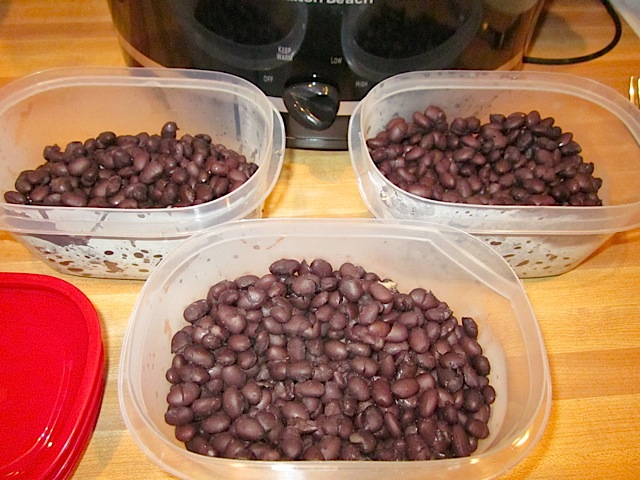I know many of you Budget Byters already cook your own beans but I wanted to make this post for all of the newbies out there. Beans are one of the most economical and nutritious foods available so I try to use them in recipes as often as possible. Canned beans are quick and convenient but with a little planning ahead, dry beans can be just as easy and HALF the cost of canned.
Many people (including myself) shy away from cooking dry beans because it seems like such a daunting chore with the overnight soaking and hours of cooking. What I’ve discovered is that cooking beans can be as easy as “setting it and forgetting it” and, thanks to Kalyn’s recent post, I now know that presoaking is not even necessary! If you cook a large batch, the beans can be divided up into two cup containers, frozen and then pulled out of the freezer as needed. Taking frozen beans out of the freezer is just as convenient as opening up a can!
Last night, I cooked up a batch of black beans for today’s soup. The final cost for one can equivalent of dry beans was $0.40 cents. Compare that to a store bought can which usually runs me about $0.79 and I’ve cut the cost in half. Plus, I’ve eliminated salt, preservatives and a lot of wasted packaging. Have I convinced you yet?
*NOTE* This method is not advised for kidney beans or beans in the kidney bean family (like white kidney beans or cannellini) because they contain a naturally occurring substance called Phytohaemagglutnin, which can be toxic to humans and cause severe GI distress. The beans must be cooked in a full boil for at least ten minutes to break down this substance, and most slow cookers do not achieve this level of heat.
How to Kick the Can (of beans)

This post contains some affiliate links, which means that we make a small commission off items you purchase at no additional cost to you.
Here is how it’s done:
STEP 1: Pour one pound (or two for an extra large batch) of beans out onto a baking sheet and sort through to remove any stones or debris. Transfer the beans to a colander to rinse off any dust.
STEP 2: Place the cleaned and sorted beans in a slow cooker and add 6 cups of water for every pound of beans. Put the lid on, set the cooker to HIGH and let her go. Beans that have not been presoaked will take 4-6 hours to cook on HIGH.
STEP 3: Once the beans are tender, pour them into a colander and give them a quick rinse. Divide the beans into containers (re-sealable or zip top freezer bags), label, date and freeze until ready to use! Easy as that.
One pound of dry beans will yield about 6 cups of cooked beans, equal to about 3 cans.

The hands-on time to make these beans was only about 15 minutes. Once they were cleaned and sorted, they go straight into the pot and then I didn’t have to do ANYTHING until I checked them four hours later. Then it’s just a quick drain, rinse and pack into containers.
You can cook beans on the stove top if you don’t have a slow cooker although it takes more attention and care. Just place them in a large pot with a lid (same water/bean ratio), bring it up to a boil then reduce the heat to low and let it simmer until tender. Do not let the beans boil heavily or else the delicate skins will disintegrate and you’ll be left with nothing but bean fragments.
If you have any tips, tricks or notable experiences cooking dry beans, share them in the comments section below!
…the black bean soup recipe should be posted later tonight ;)


I started cooking beans in the crock pot about a year ago, I will never go back, totally love the beans this way I do add 3 garlic cloves and 1/2 an onion sliced up a bit. I usually puree my beans and store them in the fridge but with the freezer option I will try doing 2lbs at a time and save me some effort
I wouldn’t rinse away the broth. It is good for making soups and stews with beans. The broth becomes thicker the following day so you end up with a tasty stew. I think this is how most people eat beans in Latin America, paired with rice, plantains or avocado. So good! :)
Does this method work for other types of beans, such as chickpeas?
Yep, it’s great for chickpeas. The only beans you need to be cautious with are beans in the kidney bean family (red and white kidneys, cannellini). Those beans have a natural compound that can cause gastro-intestinal distress (it’s toxic) and it needs to be boiled out. The slow cooker doesn’t quite get it hot enough to cook it out, so they need to be boiled on the stove top.
This is awesome. I have used this method for both black beans and chick peas and both have turned out great. Thanks Beth.
Hi Beth,
I love your site – it has helped my husband and I nearly halve our grocery bill while still eating food we love. So thanks!
A quick question about cooking beans in a slow cooker, I read that it’s not recommended due to increasing the concentration of phytohaemagglutnin (http://www.fda.gov/Food/FoodborneIllnessContaminants/CausesOfIllnessBadBugBook/ucm071092.htm). It said that slow cookers don’t sustain high enough temperatures for long enough to kill the bug, but every time I cook the beans they cook quicker than the recommended time and I’ve never been sick. Plus it seems to me that cooked on high the water is pretty hot, even if it’s not boiling.mJust wondering if you have any thoughts?
It’s usually only a problem with kidney beans and beans in the kidney bean family (like cannellini), so for those I avoid the slow cooker method. :)
I will have to give this another shot to save some money. The two times I have cooked dried beans weren’t successful. I had black beans that cooked & cooked but were never done. I also tried some beans from an Indian market that looked like small chick peas but never plumped up and never cooked either. I know not to add salt until their done so I just don’t know what I did wrong. I feel like it should not be this difficult to cook beans so I will try again.
I’ve learned a lot from other readers and sometimes if the beans are too old, they just never soften. The mineral content of your water actually greatly affects how well the beans cook, too. Some have said that a teaspoon of baking soda in the water helps, but I haven’t tried that.
I think I must hold some sort of record: a few months ago I used this method to cook chickpeas that had been lying around since March 2005 (they had a ‘best before’ date of 2007) – and they turned out perfectly!
WOW! Ha!
I haven’t used the baking soda to try to soften them. However, I have had some black beans that I cooked for two days and they never softened up. This was before I discovered that you don’t put salt in the pot when cooking your beans. Money was tight and we just couldn’t throw out the beans, but we couldn’t eat them either without fear of chipping teeth. So, I bagged them and tossed them into the freezer until I could find out what I did wrong and how to fix it. I discovered the wrong: don’t cook them with salt or anything containing salt, like bouillon. And I discovered the fix quite accidentally: freezing them broke them down. I have since used that on several other batches of beans (my girls learned the hard way too) and with several different kinds of beans. I also learned that they needed to be hard frozen, like in a deep freezer or forgotten in the back of the fridge/freezer, for close to a week before they can be taken out and used.
I have been cooking for almost 40 years and I learned a couple of new things in my first visit to your site today. Thank you! Because even an experienced cook can learn a new skill/recipe. ;-)
How long can these keep in regular air-tight containers?
In the fridge probably around 5 days. I keep them in my freezer for months, though.
I cook most of my beans in a rice cooker. After pre-soaking, I fill my rice cooker up to the max limit, and wait until it boils, then I dump my beans in, and put a timer on. It takes between 30 minutes for the smaller beans like adzuki, 45 for black beans and about 1 hour for butter beans. Perfect for the days this student studies from her home!
I add 1 T. olive oil to the slow cooker at the beginning to keep crust from forming. It makes washing the crock so much easier. I also add 2 t. of salt per pound of beans initially. I like the results but I’m convinced that beans cook very differently for different people depending on your water, age of beans etc.
About how long does the stove top method take? Thanks!
After the initial soak, it takes a couple of hours of simmering on the stove top.
Dumb question…this would be the same method for any bean and not just black beans, right?
It’s not a dumb question. :) Yes, this can be used for other beans as well, except beans in the kidney bean family (kidneys, cannellini) because they need to be fully boiled to remove a natural toxin. I like to use this method for chickpeas. :)
I use my pressure cooker for dry beans (actually, it’s the only thing I use it for.) I presoak for up to 24 hours to make sure they’re fully hydrated and swollen, that’s not really a hardship, and cook 2lbs at a time before freezing them in sandwich bags. Cooking time varies by the type of bean, but it’s mostly only about 5 minutes, plus 30 minutes cool-down time before releasing the lid. It’s important to make sure the beans are always covered with about 1/2 in of water so they don’t burst, hence the reason for complete presoaking. Once you get the timing right it produces perfect beans every time. It’s a really excellent and quick way to cook any type of bean; chick peas as well.
I made these with a 2-pound bag that had been in the pantry for longer than I care to think about. (My husband tends to buy things and forget to use them, lol) I sorted them, rinsed them, tossed them in the slow cooker with water, and let them go. About halfway through the time I added about 2T of vegetable base to the mix, but nothing more, and those beans are quite possibly as good as any I’ve ever gotten from a can! Thank you for this great and simple instructional, I’m definitely adding it to my repertoire. :)
You can cook White Northern and/ or Navy beans the same way but I add bacon drippings as seasoning
Do you salt these at all?
I didn’t because I prefer to salt the dishes that the beans go into instead. You certainly could salt them, though. I would suggest salting at the end after cooking.